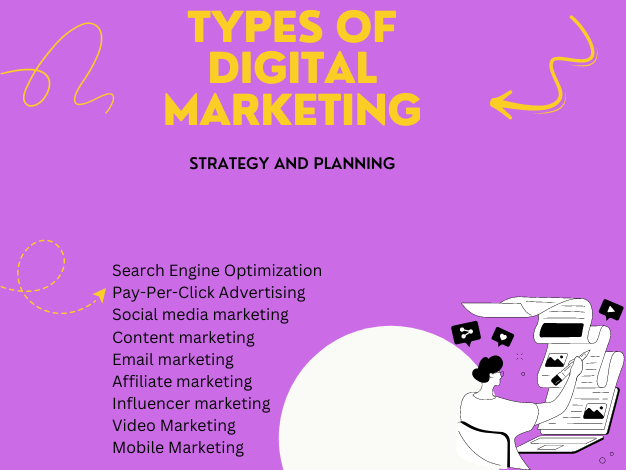There are Best Types of Digital Marketing:
Digital marketing refers to the use of digital channels and technology to promote goods, services, or brands. There are various types of digital marketing, each with its own distinct method and objective.
Following are some of the most prevalent forms of digital marketing:
Search Engine Optimization (SEO): This sort of digital marketing entails improving a website to maximize its presence in search engine results pages (SERPs) (SERPs). The purpose of SEO is to rank higher in search results for relevant keywords, which may assist bring more visitors to a website.
Pay-Per-Click (PPC) Advertising: PPC is a sort of digital marketing that includes posting advertising on search engines, social media platforms, or other websites. Advertisers only pay when a user clicks on their ad. PPC campaigns may be extremely targeted, making them a popular option for organizations trying to boost visitors to their website or create leads.
Social Media Marketing: This sort of digital marketing includes utilizing social media platforms like Facebook, Twitter, and Instagram to communicate with prospective consumers and advertise goods or services. Social media marketing may be used to boost brand recognition, attract visitors to a website, or advertise special deals or discounts.
Content Marketing: Content marketing entails developing and distributing excellent information that is aimed to attract and engage a target audience. Content may take several forms, including blog entries, videos, infographics, and eBooks. The purpose of content marketing is to develop trust and credibility with prospective consumers, eventually generating conversions.
Email Marketing: Email marketing entails delivering promotional messages or newsletters to a list of subscribers. This sort of marketing may be used to establish connections with consumers, advertise items or services, and increase traffic to a website.
-
Affiliate Marketing:
Affiliate marketing is a performance-based marketing technique where an affiliate promotes a product or service and earns a commission for each sale or lead they produce. This form of marketing might be advantageous for firms that wish to reach new audiences without spending money on advertising.
-
Influencer Marketing:
Influencer marketing entails teaming with social media influencers to promote goods or services. Influencers have enormous followings on social media and may be incredibly successful at increasing engagement and conversions.
-
Video Marketing:
Video marketing entails generating videos that promote a product or service. Video can be incredibly engaging and is frequently used to explain items or highlight client testimonials.
-
Mobile Marketing:
Mobile marketing includes addressing clients on their mobile devices via SMS messaging, mobile applications, or mobile web advertising. This form of marketing may be incredibly beneficial for organizations targeting a mobile-first audience.
-
Display Advertising:
Display advertising includes displaying banner adverts or other sorts of graphic ads on other websites. This sort of marketing may be used to attract visitors to a website or advertise items or services.
Email marketing preferred type of digital Marketing
Email marketing is a sort of digital marketing that includes delivering promotional messages or newsletters to a list of subscribers through email. It is a highly effective way to reach out to potential customers, build relationships with existing ones, and promote products or services.

These are some important advantages of email marketing:
Cost-effective: Email marketing is a cost-effective technique to reach out to prospective consumers. Most email marketing systems charge a monthly subscription depending on the size of your subscriber list.
High ROI:
Email marketing offers a high return on investment (ROI) (ROI). According to the Direct Marketing Association, the average ROI for email marketing is $38 for every $1 invested.
- Personalization: Email marketing enables firms to customize their messaging to each subscriber. This may assist develop closer ties with consumers and enhance engagement.
- Measurable: Email marketing is extremely quantifiable. Companies may measure metrics like open rates, click-through rates, and conversion rates to assess the efficacy of their campaigns.
- Automation: Email marketing systems typically include automation tools, enabling organizations to build up automatic email sequences that are triggered by subscriber behavior or particular events.
- Segmentation: Email marketing enables organizations to segment their subscribers depending on numerous parameters, such as demographics, purchasing history, or engagement level. This may help firms focus their communications to certain groups of subscribers.
- Mobile-friendly: Most email marketing systems provide mobile-friendly templates, ensuring that emails are optimized for mobile devices.
Ultimately, email marketing is a strong tool for organizations trying to reach out to consumers, create connections, and drive sales. Yet, it’s crucial to ensure that emails are relevant, useful, and engaging to avoid being designated as spam or ignored by subscribers.
Influencer type of digital marketing
Influencer marketing is a sort of digital marketing that includes collaborating with social media influencers to promote companies or services. Influencers are persons with big followings on social media sites like Instagram, YouTube, or TikTok. By working with influencers, companies may harness their reach and influence to reach new audiences and market their goods or services.

These are some important advantages of influencer marketing:
-
Improved reach:
Influencer marketing helps firms to access new audiences that they may not have been able to reach otherwise. By working with influencers, companies may tap into their massive followings and harness their influence to market their goods or services.
-
Authenticity:
Influencers are generally perceived as genuine and trustworthy by their followers. By working with influencers, companies can tap into this authenticity and develop trust with prospective consumers.
-
Targeted audience:
Influencers generally have a certain niche or population that they appeal to. By working with influencers in a relevant area, companies may focus their message to a particular audience.
-
Creative material:
Influencers are frequently incredibly creative and can develop compelling content that connects with their following. By working with influencers, organizations can tap into this ingenuity and develop content that is both interesting and successful.
-
Measurable results:
Influencer marketing is extremely quantifiable. By tracking metrics such as engagement rates, click-through rates, and conversions, businesses can determine the effectiveness of their campaigns and adjust their strategies as needed.
-
Cost-effective:
Influencer marketing can be a cost-effective way to reach new audiences. Depending on the size and influence of the influencer, businesses may be able to reach thousands or even millions of people for a fraction of the cost of traditional advertising.
Ultimately, influencer marketing may be a valuable strategy for firms trying to reach new audiences and promote their goods or services. Yet, it’s crucial to carefully identify influencers that are a good match for the business and ensure that the collaboration is legitimate and helpful to both sides.

